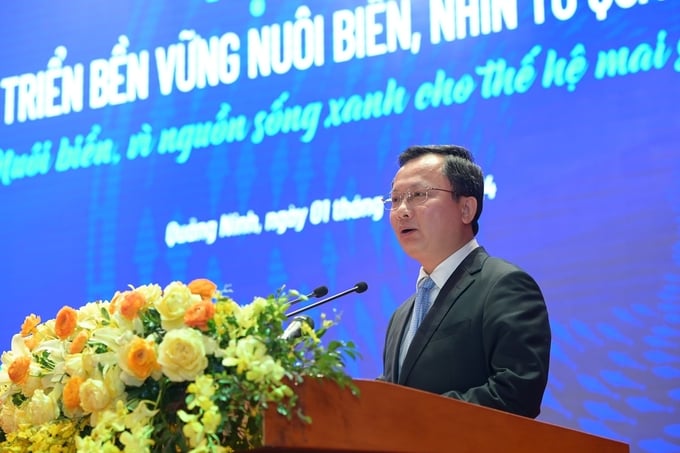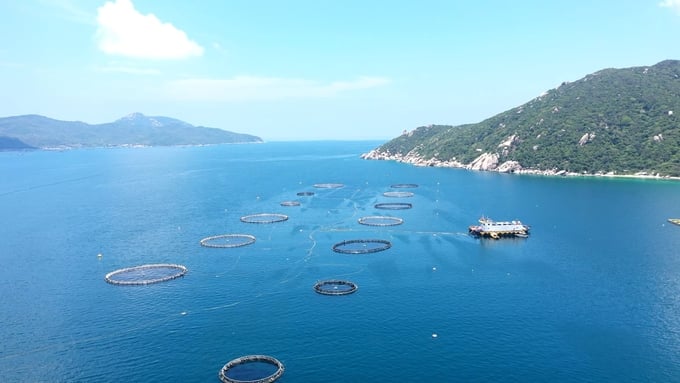November 27, 2025 | 18:52 GMT +7
November 27, 2025 | 18:52 GMT +7
Hotline: 0913.378.918
November 27, 2025 | 18:52 GMT +7
Hotline: 0913.378.918

Overhead view of the Sustainable Mariculture Development Conference - Insights from Quang Ninh on April 1. Photo: Tung Dinh.
In commemoration of the 65th anniversary of Vietnam's fisheries sector and the day President Ho Chi Minh visited and encouraged fishermen in Cat Ba district and Tuan Chau island, Ha Long city, a series of of activities was held over the course of two days (March 31 - April 1) in Quang Ninh province. Leaders from the Ministry of Agriculture and Rural Development and coastal provinces, coordinated with businesses, fisheries cooperatives, and the local community of Quang Ninh province to promote the spirit of "a green and sustainable marine environment with diverse aquaculture resources." The Sustainable Mariculture Development Conference - Insights from Quang Ninh on the morning of April 1 saw numerous constructive exchanges, demonstrating a visionary outlook for Vietnam's aquaculture industry.
Following the discussion session on "Potential and Challenges of Mariculture," and the speeches of domestic and international high-level managers and scientists, Chairman of the Quang Ninh Provincial People's Committee Cao Tuong Huy, affirmed: "With support from the Ministry of Agriculture and Rural Development, Quang Ninh province is determined to become the center for mariculture of Northern Vietnam, as outlined in Decision No. 1664/QD-TTg on mariculture, approved by the Prime Minister on October 4, 2021."

Mr. Cao Tuong Huy, Chairman of the Quang Ninh Provincial People's Committee, delivering a speech at the conference. Photo: Tung Dinh.
Subsequently, chairman Cao Tuong Huy outlined 6 key tasks for the Quang Ninh Provincial People's Committee to direct and implement immediately after the conclusion of the Sustainable Mariculture Development Conference.
Firstly, implement synchronized and effective development of mariculture in Quang Ninh province, with a focus on the national targets for aquaculture development. In addition to developing into a major mariculture and fisheries center, Quang Ninh must maintain its stance on the logical utilization of mariculture resources; maintain a balance between mariculture and the development of landscape and cultural tourism; industrialize mariculture with advanced technology, comprehensive planning, modern management methods; safely and scientifically manage cage aquaculture in accordance with provincial master plans.
Secondly, the Quang Ninh province's agriculture and rural development sector, as well as its coastal regions' government, should effectively manage and sustainably exploit 45,000 hectares of planned coastal areas; enhance the quality of human resources in the fisheries sector; promote the transformation of the labor structure; foster employment opportunities, and stable income improvement for local workers.
Thirdly, reinforce market development, with mid-term and annual production plans to meet supply and market demand.
Fourthly, social policy banks, agricultural banks, in coordination with the agriculture and rural development sector, should enhance credit mechanisms and policies to provide stable investment capital for mariculture development; collaborate with natural resources and environment sectors to simplify administrative procedures in environmental impact assessment, and mariculture area allocation.

Cooperatives and individual mariculture households need to establish effective linkages to enhance the quality of aquatic products. Photo: Duy Hoc.
Fifthly, businesses, cooperatives, and independent mariculture households, which have been licensed and assigned marine areas for mariculture by the government, are recommended to organize production linkages, thereby optimizing investment efficiency and improving the quality of aquatic products.
Fourthly, effectively implement the Provincial Key Agricultural Product Value Chain for the fisheries sector in 2024. Establish a linkage chain between the production, processing, and consumption of aquatic products. Consequently, form a modern aquaculture production-logistics system in the province in association with the national export system.
Chairman of the Quang Ninh Provincial People's Committee Cao Tuong Huy, expressed appreciation towards the leaders of the Ministry of Agriculture and Rural Development, ambassadors of various countries, leading aquaculture experts, the business community, and investors for attending the Sustainable Mariculture Development Conference - Insights from Quang Ninh; whose contributions help shape the future of mariculture in Vietnam.
During the conference, Mr. Nguyen Minh Son, General Director of the Quang Ninh province's Department of Agriculture and Rural Development, granted mariculture licenses and allocated marine areas to representatives from Trung Nam Cooperative, Manh Duc Aquatic Products Trading and Services Cooperative, Thang Loi Aquaculture Cooperative, Bao Anh Aquaculture Development and Services Cooperative, Trong Vinh Aquaculture and Trading Cooperative, and STP Aqua Joint Stock Company. Accordingly, administrative procedures related to mariculture licenses have been streamlined and simplified under the guidance of Quang Ninh province.
Translated by Nguyen Hai Long

(VAN) According to Mr. Vo Minh Thanh, Director of the Tay Ninh Department of Agriculture and Environment, Resolution 57 has created a new development pathway for the locality, shifting from traditional toward modern agriculture.
/2025/11/26/4909-2-154329_878.jpg)
(VAN) Pearl grouper farming in HDPE cages not only delivers economic efficiency but also contributes to protecting the environment, creating jobs, and promoting marine-based experiential tourism.

(VAN) The model of making a living under the forest canopy through the agroforestry system in Van Son commune, Bac Ninh province, is expected to generate an annual income of approximately VND 30 million/ha.

(VAN) Many enterprises in Can Tho are harnessing natural energy and reducing greenhouse gas emissions in their production processes, thereby contributing to the promotion of a sustainable green transition.
/2025/11/24/3536-2-112800_176.jpg)
(VAN) Dong Nai now has tens of thousands of hectares of forests certified for sustainable management, and this area will continue to be expanded in the coming period.

(VAN) Vinh Ha hamlet (Dai Xuyen commune, Hanoi) is shifting away from small-scale farming as households adopt bioscurity into their breeder chicken models.

(VAN) Heavy rains make aquatic species more vulnerable to disease. Proactive water management and high-tech systems help farmers prevent outbreaks and protect yields.